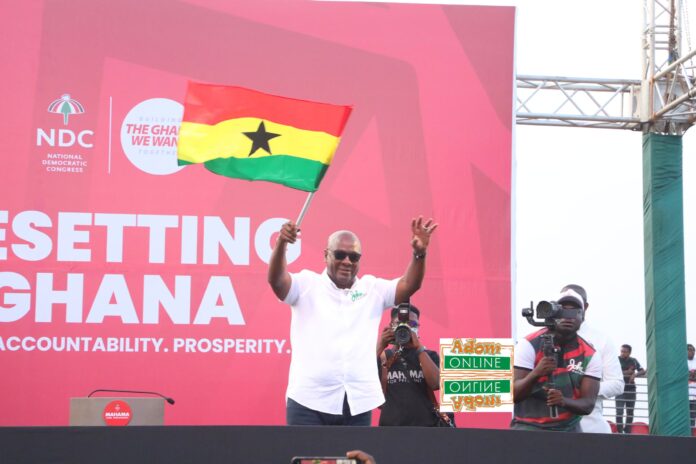The 2024 elections in Ghana have ushered in a profound shift in the nation’s political landscape. The decisive victory of the opposition National Democratic Congress (NDC) in both the presidential and parliamentary races reflects a clear mandate from the people: the demand for change and accountability in governance.
This pivotal moment signals not just a change in leadership but a deeper transformation in Ghana’s democratic trajectory.
For a country known for its robust democracy and peaceful transfers of power, these elections reaffirm the strength of the people’s voice and their resolve to demand leadership that prioritizes their welfare.
1. A Mandate for Change
The 2024 elections were a referendum on the performance of the outgoing New Patriotic Party (NPP) government led by President Nana Akufo-Addo. Despite initial successes in areas like education, the government faced mounting criticism for economic hardships, corruption, and environmental degradation.
Economic Struggles
Rising inflation, a depreciating cedi, and soaring public debt had a tangible impact on Ghanaians’ daily lives. The austerity measures tied to an International Monetary Fund (IMF) bailout exacerbated these challenges, with many citizens feeling the economic squeeze. Jobs were scarce, businesses struggled, and purchasing power dwindled—factors that deeply influenced voter sentiment.
Corruption and Accountability Deficit
Scandals like the Agyapa Royalties deal and the government’s failure to address corruption eroded public trust. The perception that officials prioritized personal gain over public service became a rallying cry for change. Citizens demanded a leadership that would put the national interest first and uphold principles of transparency and accountability.
2. The People’s Revolution
The results of the elections underscore the power of Ghana’s electorate. This was not just a rejection of the NPP’s governance but an affirmation of the people’s capacity to hold leaders accountable.
Youth as Catalysts of Change
Ghana’s youth played a pivotal role in this transformation. Frustrated by unemployment and disillusioned with unfulfilled promises, they turned out in large numbers to demand a future that aligns with their aspirations. Social movements like FixTheCountry amplified their voices, emphasizing the need for systemic reform and sustainable development.
Grassroots Mobilization
The NDC’s victory was fueled by effective grassroots engagement. By addressing local concerns and presenting a clear vision for the future, the party managed to connect with voters across regions, including traditional strongholds of the NPP.
3. Change in Leadership, Change in Vision
The newly elected NDC administration has promised a governance approach centered on inclusivity, accountability, and development. While their victory signals hope, it also comes with immense responsibility.
Economic Recovery
The immediate challenge for the new government is stabilizing the economy. Priorities will include reducing inflation, creating jobs, and managing the public debt without imposing further hardships on citizens. Programs that empower small businesses, enhance agricultural productivity, and promote industrialization will be key.
Tackling Environmental Challenges
One of the most pressing issues is the galamsey (illegal mining) crisis, which has devastated Ghana’s environment and water bodies. The NDC must take bold steps to restore ecosystems, regulate mining activities, and offer alternative livelihoods to communities affected by illegal mining.
Restoring Public Trust
To rebuild confidence in governance, the new administration must strengthen anti-corruption institutions and ensure accountability at all levels. Transparent investigations into past scandals will be essential to demonstrate their commitment to ethical leadership.
4. A Model for African Democracy
Ghana’s peaceful transition of power once again cements its position as a beacon of democracy in Africa. The active participation of civil society, independent media, and a politically engaged youth has shown the world what a thriving democracy looks like.
The Role of Civil Society
Movements like FixTheCountry and investigative journalism have held leaders accountable, ensuring that the concerns of ordinary citizens remain at the forefront. The continued vigilance of these groups will be crucial in ensuring that this change leads to real progress.
The Power of the Ballot
The elections reaffirm the fundamental principle that power belongs to the people. For Ghana and the continent, this serves as a reminder that democratic governance can flourish when citizens are empowered to demand better from their leaders.
5. The Road Ahead
While change has come to Ghana, the journey is just beginning. The new administration faces high expectations and complex challenges. Delivering on promises will require bold leadership, innovative policies, and collaboration across political divides.
Key Priorities
- Job Creation: Expanding opportunities for youth through entrepreneurship, technology, and skills development.
- Education and Healthcare: Strengthening access to quality services for all citizens.
- Infrastructure Development: Investing in sustainable energy, transportation, and urban planning to support growth.
- Environmental Restoration: Combating the effects of illegal mining and promoting green development. A Partnership with the People
The success of this new chapter depends not only on the government but also on the active participation of citizens. Holding leaders accountable, advocating for transparency, and engaging in constructive dialogue will ensure that this change endures.
Conclusion: A Brighter Future for Ghana
The 2024 elections mark the dawn of a new era for Ghana—a time when the people’s collective voice demanded a leadership that truly serves their interests. Change has come, and with it, the opportunity to build a nation rooted in justice, prosperity, and sustainability.
As Ghana moves forward, the lessons from this historic moment will serve as a guiding light for future generations. Together, the government and the people can chart a path toward a brighter, more inclusive future, proving that in a democracy, the will of the people is not just a concept but a powerful force for progress.
*****
Ernest De-Graft Egyir
Founding CEO
CEO Network Ghana


